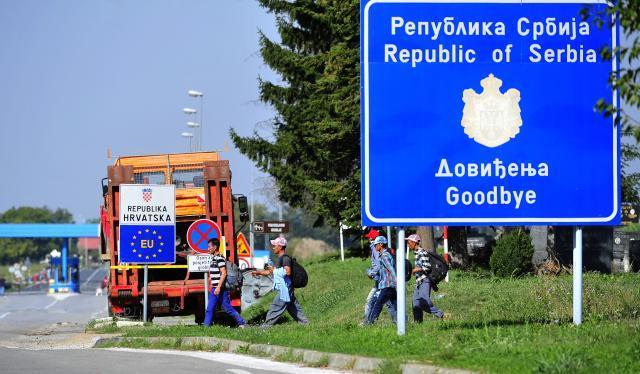Balkans: No war, but migrant crisis can create obstacles
Friday, 12.02.2016.
17:03

Balkans: No war, but migrant crisis can create obstacles
Chancellor Angela Merkel, speaking recently to her fellow party members, warned that a closing of borders in Europe, specifically between Germany and Austria, could lead to conflict and war in the Balkans. This statement had multiple addresses: the German public as well as coalition partners, who were being warned what a collapse of the Schengen open-border regime could bring about internally as well as in the immediate European neighborhood. Her speech was also a warning to the leaders and states in the Balkans to cooperate rather than fall prey to mutual recriminations.In concert with the EU, Germany is muddling through this crisis. For the moment there is a worrisome lack of a much needed, united strategic approach to everything from asylum policies and relocation schemes to enhanced external EU border controls.
The Western Balkans constitute only one piece of this complex puzzle. The clear and immediate goal is to stem the ow of refugees and migrants and to keep them in the vicinity of the countries from where they have ed, be they in the Middle East or Africa. The eradication of the root cause in the Middle East is badly needed but nowhere in sight.
Geography and geopolitics matter. The Balkans are not the periphery, as is sometimes said; they are the inner courtyard of the European Union, surrounded by EU and NATO member-states. This Southeastern European peninsula – the Western Balkans – remains the last non-integrated part of Europe. This is unfinished business for the EU and a serious test for its credibility. If the EU is unable to help spur the enlargement process to the Western Balkans, it is hard to grasp how capable it is in dealing with other challenges.
The EU Summit in Thessaloniki in June 2003 opened the pathway to full membership for the Balkan countries. All have committed to both EU and NATO integration (except, at the moment, Serbia when it comes to NATO). Only Croatia has made it into both NATO and the EU; the others are moving toward this goal, some clearly with great difficulty – in particular Macedonia (largely due to its dispute with Greece over its name) and Bosnia and Herzegovina. Montenegro, Serbia and Albania have achieved candidate status and the first two are already negotiating their entry.
The challenges in the region are undoubtedly grave: very low economic growth, high unemployment rates and the stagnation or decline of living standards coupled with a continuing brain-drain and several unresolved regional issues.
However, war will not return to the Western Balkans. The con ict in the 1990s, which ended with 78 days of bombing of the then Federal Republic of Yugoslavia, is much too present in the minds of the political leaders and the societies that suffered and paid such a huge price. No one wants to revisit such times, no matter how domestic political rhetoric may sound.
Even the migrant crisis will not lead to war, though it can clearly exacerbate tensions and create further obstacles to the integration process. In fact, compared to other parts of the world the Balkans are an oasis of peace. And there is a reason for this: the existence of the European Union and its enlargement policy.
This leads to a second observation: Notwithstanding the current crisis, the soft power of the EU is alive and well in the Western Balkans. The Belgrade-Pristina agreement signed by the prime ministers of Serbia and Kosovo under the aegis of the EU High Representative Catherine Ashton in 2013, and now carried forward by her successor Federica Mogherini, testifies to the beneficial and soothing effects of the EU’s soft power in the region.
Germany’s initiative in the progression toward enlargement, the Berlin Process begun in August 2014, has been of utmost importance. At the same time the US firmly backs the Balkans’ integration into the EU.
NATO is also a significant stability factor with its on-going mission in Kosovo and as guarantor for the Belgrade-Pristina agreement. Furthermore, the recent invitation to Montenegro to become a NATO member state sent a strong message to all actors in the region. The two-day visit to Serbia last November by the NATO secretary general was a notable event.
Moscow’s new assertiveness was demonstrated by its actions in Ukraine. Russia’s annexation of Crimea and its violation of Ukraine’s sovereignty have been a serious cause of concern. Moscow has been trying to drive a wedge in the region between those who are opposed to Euro-Atlantic integration and those who see their future as lying firmly with the EU and NATO. Russia’s key relationship with the region is based on its energy and gas exports.
The migration crisis has shown that, for all intents and purposes, the Western Balkans are a de facto member of the EU and more broadly of the Euro- Atlantic arena. The migrants enter an EU member state, Greece, then pass mostly through Macedonia and Serbia to enter another EU member state, Croatia. No concrete solution is possible without the full involvement of these countries.
War should never have occurred in Europe at the end of the 20th century. It did – and Yugoslavia disappeared in a self-inflicted, violent conflict that would ultimately result in its division into seven countries. The region of the Western Balkans and its citizens must find an accelerated path into the EU while respecting all its rigorous criteria for membership.
Ivan Vejvoda is senior vice president of the German Marshall Fund of the United States

























































Komentari 0